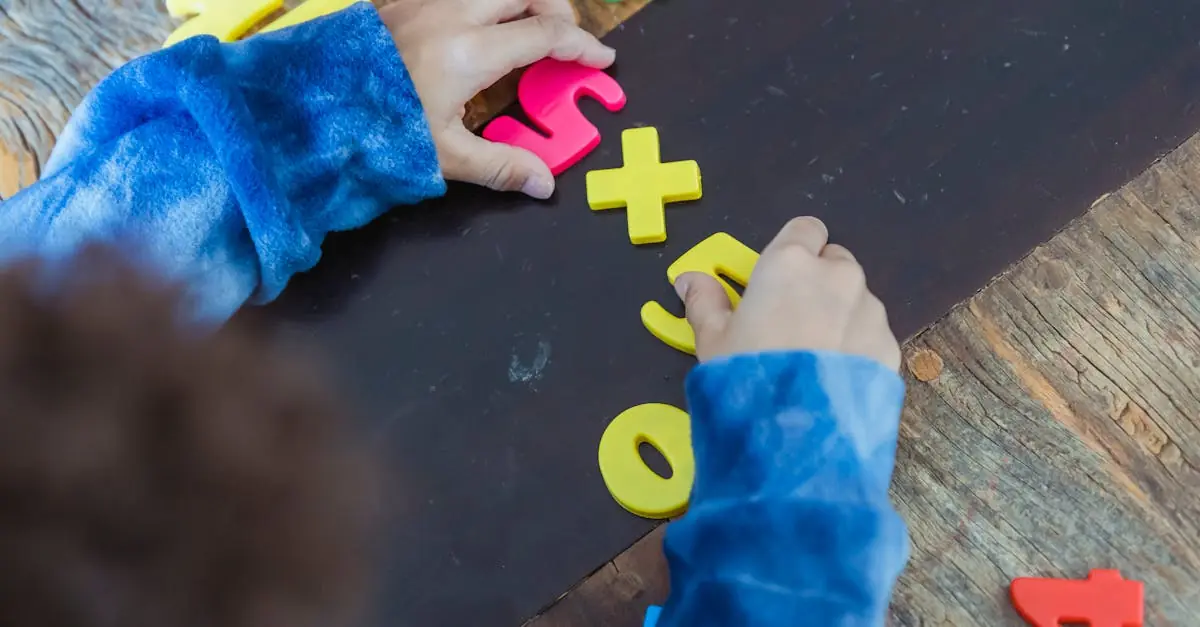In today’s fast-paced world, early childhood education isn’t just a luxury—it’s a necessity. With kids’ brains operating at warp speed, parents and educators alike are racing to keep up. The days of simply coloring within the lines are long gone; today’s little learners are diving into a world of creativity, exploration, and critical thinking. Who knew that teaching a toddler to share could be as complex as negotiating a peace treaty?
Table of Contents
ToggleOverview Of Early Childhood Education Today
Early childhood education emphasizes holistic development, integrating academics with emotional and social skills. Curriculums now focus on creativity and critical thinking, fostering children’s natural curiosity. A hands-on approach encourages exploration through play, enhancing learning retention.
Educational environments have shifted, incorporating diverse teaching methods tailored to individual needs. Teachers utilize various techniques, like project-based learning and interactive storytelling, to engage students. Collaboration among educators, parents, and communities strengthens support networks, promoting a richer educational experience.
Funding for early childhood programs has become crucial, reflecting the increasing recognition of its significance. Studies show that high-quality early education can lead to improved academic performance and social skills, increasing long-term success. Ninety percent of brain development occurs before age five, underscoring the need for early intervention.
Social skills development takes precedence in modern classrooms, equipping children with essential communication abilities. Programs often integrate lessons on empathy, teamwork, and conflict resolution, essential for navigating future social interactions. Teaching children how to manage emotions is as vital as instilling academic knowledge.
Curricular adaptations accommodate diverse learning styles, ensuring inclusivity. Current best practices include tailored activities for a range of abilities, promoting engagement among all students. Offering bilingual education also cultivates a deeper understanding of cultural diversity, preparing children for a globalized world.
Overall, early childhood education today prioritizes comprehensive growth, blending learning with social and emotional development. This multifaceted approach supports children as they transition into formal education, laying a foundation for lifelong learning.
Importance Of Early Childhood Education
Early childhood education plays a crucial role in laying a strong foundation for children’s futures. This period is pivotal for both developmental and emotional growth.
Developmental Benefits
Development during early childhood encompasses a wide range of skills. Cognitive abilities emerge rapidly, with children mastering concepts through hands-on experiences. The focus on play-based learning enhances memory retention and fosters critical thinking skills. According to studies, high-quality early education results in better academic performance later in life. Ninety percent of brain development occurs before age five, making this stage vital for learning. Engaging in creative activities strengthens problem-solving abilities and boosts confidence. This dynamic environment also supports language acquisition, equipping children with essential communication skills and expanding their vocabulary.
Social and Emotional Growth
Social and emotional development significantly impacts children’s interactions and relationships. Learning to share and cooperate prepares children for teamwork in the future. Educators emphasize empathy, teaching children to understand and respond to the feelings of others. Lessons in conflict resolution provide essential tools for handling disputes calmly. Emotional intelligence becomes a crucial component of a child’s development, building resilience and self-regulation. Programs often include collaboration with families, reinforcing the importance of support systems. As children engage in diverse social settings, they develop adaptability and leadership skills. Overall, early childhood education promotes strong emotional bonds, laying the groundwork for positive relationships throughout life.
Current Trends In Early Childhood Education
Early childhood education today embraces innovative approaches that cater to children’s diverse needs. Two notable trends include technology integration and a focus on inclusivity.
Technology Integration
Technology has become an integral component of early childhood education. Digital tools enhance learning experiences through interactive applications that engage children. Tablets and educational software support personalized learning, allowing educators to tailor lessons based on individual progress. Virtual reality offers immersive environments for exploration, making learning more relatable and exciting. Research shows that these technological advancements promote critical thinking skills and encourage collaboration among peers. With children increasingly familiar with technology, early educators now incorporate it effectively into curriculums, merging traditional methods with modern tools to create a balanced educational experience.
Focus On Inclusivity
Inclusivity represents a core principle in modern early childhood education. Teachers design classrooms that accommodate diverse learning styles and abilities, ensuring every child feels valued. Curriculums emphasize multicultural education, introducing children to various cultures, languages, and perspectives. Bilingual education fosters communication skills and cultural understanding, vital for developing empathy. Collaborative approaches involve parents and communities, enhancing support networks for students. Educators prioritize social skills development to equip children with abilities that promote cooperation and teamwork. Research confirms that inclusive practices not only benefit individual learners but also cultivate a sense of belonging and acceptance for all, laying the foundation for healthy interactions in future educational settings.
Challenges Facing Early Childhood Education Today
Early childhood education faces significant challenges that impact its effectiveness. Funding issues and teacher shortages represent two critical hurdles.
Funding Issues
Funding issues plague early childhood education programs across the nation. High-quality early education relies on stable financial support, yet many programs struggle to secure adequate resources. Studies indicate that investment in early childhood leads to long-term academic benefits, yet only a fraction of state budgets prioritize these initiatives. Budget cuts often result in fewer resources, larger class sizes, and lowered access for families in need. Educational institutions, especially non-profits, frequently seek grants or donations to maintain operations. Insufficient funding diminishes the quality of learning environments, placing strain on educators and reducing overall program effectiveness.
Teacher Shortages
Teacher shortages in early childhood education have reached alarming levels. Many qualified teachers leave the profession due to low salaries and high stress, exacerbating the crisis. Class sizes grow larger as institutions struggle to attract new educators, diminishing personalized attention for each student. Additionally, professional development opportunities often remain limited, deterring newcomers from pursuing teaching careers. Institutions rely heavily on passionate individuals, but the lack of support for career advancement leads to higher turnover rates. Without stable staffing, the continuity of care for young learners suffers, impacting their social and emotional development. Stability and support for educators remain essential to ensure the success of early childhood education programs.
Future Perspectives On Early Childhood Education
Early childhood education faces a dynamic landscape shaped by evolving practices and policies. Understanding these aspects is essential for fostering effective educational environments.
Policy Changes
Policymakers are reevaluating early childhood education frameworks to enhance accessibility and quality. Recent reforms emphasize the necessity of increased funding for programs, as high-quality education significantly boosts children’s academic outcomes. Legislation now advocates for universal pre-K initiatives, aiming to ensure that all children have access to early learning experiences. In response to growing research, there’s a focus on integrating social-emotional learning into curriculums, aligning educational standards with developmental needs. These policy shifts not only prioritize inclusivity but also reflect the growing recognition of early education as a vital investment in children’s futures.
Innovative Teaching Methods
Innovative teaching methods are transforming how educators engage with young learners. Play-based learning strategies have gained emphasis, promoting exploration and creativity as central components of the educational experience. Educators now incorporate technology through interactive tools, enhancing engagement and personalized learning opportunities. Classrooms increasingly embrace project-based learning, which encourages collaboration and critical thinking. Additionally, outdoor experiences are utilized to connect children with nature, fostering holistic development. Such adaptive methods respond to varying learning styles, ultimately ensuring that all students thrive in supportive, enriching environments.
Early childhood education is more important than ever in shaping the future of children. The focus on holistic development and the integration of social-emotional learning prepares children for success in life. As educational practices evolve to include technology and inclusivity, the need for stable funding and qualified educators becomes increasingly critical.
Addressing the challenges of funding and teacher shortages will ensure that all children have access to high-quality early education. By fostering creativity and critical thinking through innovative teaching methods, society can empower the next generation to thrive. Investing in early childhood education not only benefits individual learners but also strengthens communities and enhances overall societal well-being.




